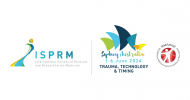Session outline
India became a signatory to UNCRPD (United Nations Convention on the Rights of Persons with Disabilities) and ratified it more than a decade back. A significant number of resources have been mobilized for enabling the provisions in area of facilitating access to quality mobility aids, devices, assistive technologies, and forms of live assistance at affordable cost.The recent developments at WHO relating to the theme ‘Rehabilitation 2030’ have further strengthened the process leading to fresh impetus on development of newer programs and involvement of more stakeholders across the assistive technology innovation, manufacturing, provision, maintenance, and follow-up programs with focus on innovate and make in India. Physical Medicine and Rehabilitation has been integrated into Medical Undergraduate teaching and the process of making it mandatory in all medical colleges is ongoing. Indian Council of Medical Research, Department of Biotechnology and various Ministries have made programs and schemes for newer developments in India for facilitation of world class technology development and access to the products at affordable cost to the users. The detailed Policy analysis and its impact will be discussed in detail. The detailed Policy analysis based on WHO objective of ”Rehabilitation 2030” will be presented along with the paper on “ WHO Systematic Assessment of Rehabilitation Situation (STARS): A systematic review on the status of stroke rehabilitation in India”.
Comprehensive rehabilitation is provided to patients with spinal cord injury starting from acute period to post-acute period and all the way to community reintegration. Regular follow ups are performed through home visits and telemedicine consultations. Research on various aspects of spinal cord injury rehabilitation has enhanced better delivery of evidence based practice in Better networking among patients, empowerment through sports etc. have helped to improve quality of life of patients. Robotic technology and virtual reality have been introduced for gait training and upper extremity training for incomplete spinal cord injury patients. Research on “Assessment of Renal Function in Persons with Motor Complete Spinal Cord Injury- Cystatin C as an accurate single marker” will be discussed.
Challenges faced include financial limitations, architectural and attitudinal barriers, inadequate number of rehabilitation physicians and rehabilitation centers in the country. To reduce the burden and enable equitable access to rehabilitation services, the local NGOs have partnered with Government rehabilitation centers and are providing subacute rehabilitation service. One such service is a spinal rehabilitation center in rural South India. Given the limited number of rehabilitation physicians in the country an Australian trained rehabilitation Physicians is taking advantage of technology and providing an international tele rehabilitation consultation service to this center for the last 7 years. We will be discussing on how to set up an international tele-rehab model of care from scratch, the lessons learnt, challenges faced and whether it has transferable potential to other countries where there are limited resources.
Learning outcomes
India is currently a fertile platform for innovation and development of newer technologies in the field of rehabilitation. The deliberation’s during the workshop will give the audience a bird’s eye view of the evolving technology scene in India and will pave way for future collaborations to take it forward.
Target audience
Allied health, Policy Makers, Medical Practitioners, Students, Trainees, Nursing Staff and General Public will benefit, Persons with disability needing rehabilitation such as stroke, SCI, Elderly



